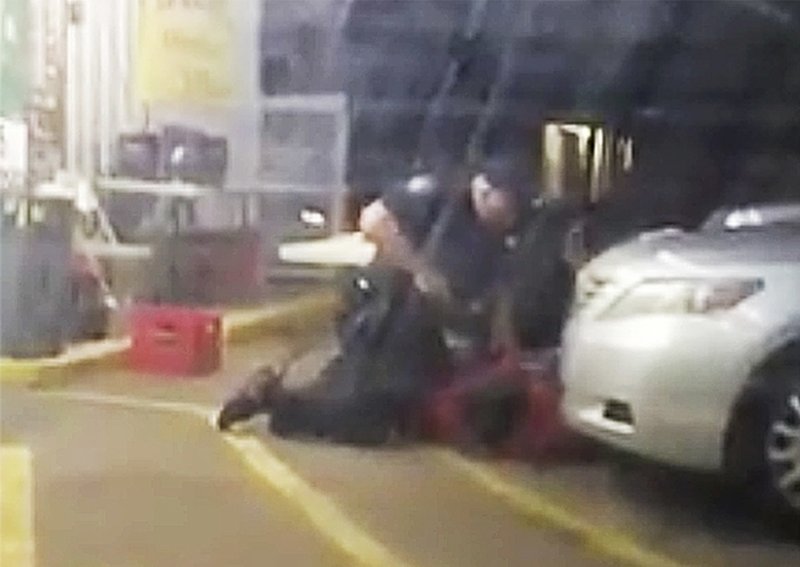A Louisiana police chief apologized Thursday to his city and to the family of a black man shot and killed by a former police officer in 2016, saying the officer never should have been hired, at the same time his office announced a settlement reversing the officer’s 2018 firing and allowing him to resign instead.
At a news conference in Baton Rouge, Police Chief Murphy Paul and a police lawyer detailed repeated problems with Officer Blane Salamoni that they said should have raised red flags long before Alton Sterling was shot and killed.
Paul was not the chief at the time of the shooting, which launched days of protests over police treatment of black people.
In particular, the lawyer, Leo Hamilton, said Salamoni had been arrested for a physical altercation prior to joining the police department, which normally would have prevented him from being hired. He also failed to disclose his arrest in his application, Hamilton said.
The chief said the Sterling shooting was part of a well-documented pattern of “unprofessional behavior, police violence, marginalization, polarization and implicit bias by a man who should have never ever wore this uniform.”
“I want to apologize to the family of Alton Sterling and also to his kids. We’re sorry because he (Salamoni) should’ve never been hired,” Paul said.
Both state and federal officials declined to prosecute Salamoni and another officer involved in the altercation with Sterling, Howie Lake II. Salamoni — who fired all the shots that killed Sterling — was fired by Murphy in March 2018.
Salamoni appealed and under the settlement announced Thursday, he’ll be allowed to voluntarily resign retroactive to March 2018 instead of being fired. He will not receive any compensation, Hamilton said.
Hamilton said authorities continue to believe Salamoni’s firing was justified but said they advised settling because there was no guarantee that the firing wouldn’t be reversed in litigation. And Paul emphasized that Salamoni would never police Baton Rouge streets again.
Salamoni’s lawyer, John McLindon, said they’re happy the settlement withdraws his termination and allows him to resign.
McLindon said his client would have easily won reinstatement in an upcoming hearing but that he and Salamoni questioned what that would have achieved. McLindon said his client can resign and become an officer elsewhere if he wants.
He said his client had been cleared by both state and federal officials and emphasized that Sterling had a gun and was pulling it out when Salamoni shot him. He criticized the chief’s comments critical of Salamoni, calling them “inappropriate.”
McLindon also disputed that Salamoni had been arrested before starting with the police department.
Officials did not give any information about Salamoni’s pre-employment arrest but The Advocate newspaper described a 2009 incident in downtown Baton Rouge in which Salamoni was detained by police after an off-duty sheriff’s deputy saw him yell at and shove a woman at a bar.
Alton Sterling’s death came at a time of intense scrutiny across the country over the treatment of black people by police.
Salamoni and Lake encountered Sterling after responding to a report of a man with a gun outside the Triple S Food Mart.
Federal authorities, who opened a civil rights investigation immediately after the shooting, said Salamoni yelled that 37-year-old Sterling was reaching for a gun in his pocket before shooting him. The officers recovered a loaded revolver from Sterling’s pocket.
Lake helped wrestle Sterling to the ground, but didn’t fire his gun.
Two cellphone videos of the shooting quickly spread on social media, leading to nightly protests.
Many of the protesters complained about historic tensions between Baton Rouge police and the city’s African American residents. The police chief addressed those concerns Thursday, acknowledging past problems with law enforcement behavior.
“While we obviously cannot change the past, it is clear that we must change the future. And I sincerely apologize for the actions of the past and the role that our profession has played in building barriers in communities of color in the city of Baton Rouge,” Paul said.
Hamilton listed numerous problems investigators discovered about Salamoni, including regular use of profanity and unnecessary force during his work.
He even had problems with other officers. In one instance, Hamilton said Salamoni had a “blow up” with another officer that was so troublesome it caused another officer to say that if something wasn’t done about Salamoni, he could “eventually kill someone.”
Sterling’s relatives have filed a lawsuit against the city. Michael Adams, a lawyer representing three of Sterling’s children in the civil suit, said it was “refreshing” to hear a police chief come out and speak so frankly about the officer’s shortcomings. But he said the city knew Salamoni was a bad cop who was poorly trained and protected from within the department.
(AP)











